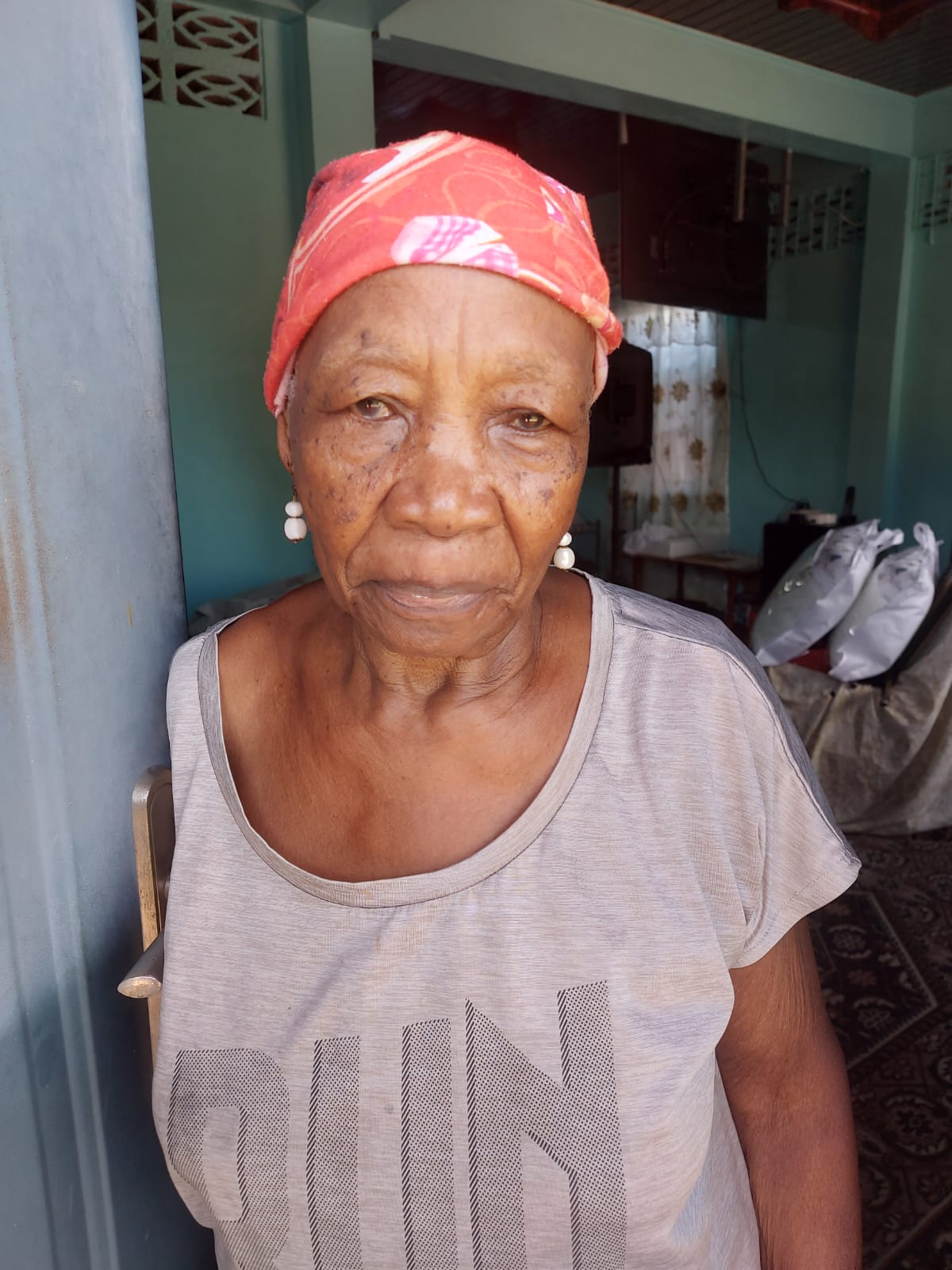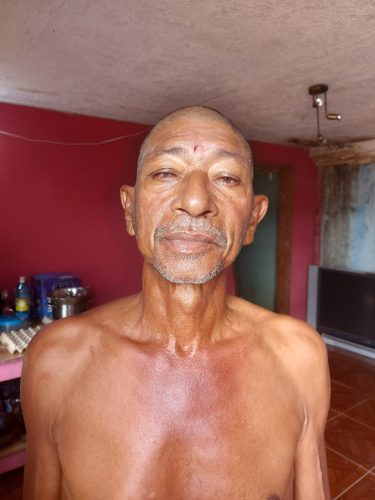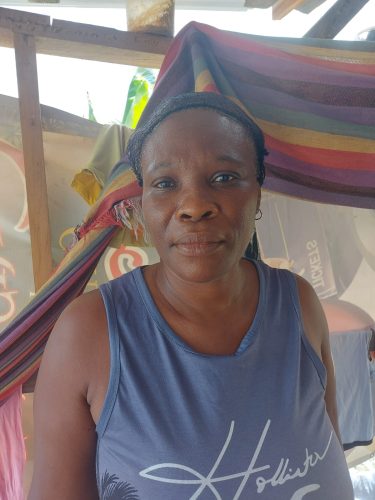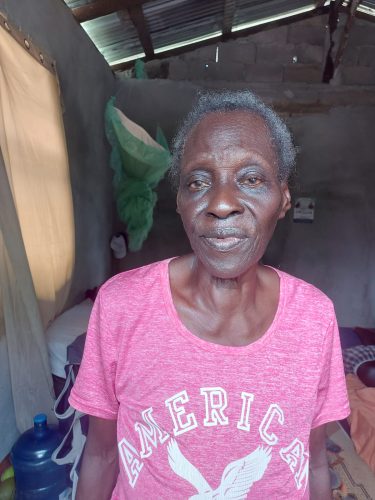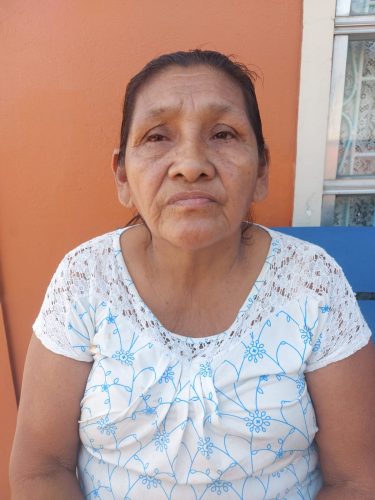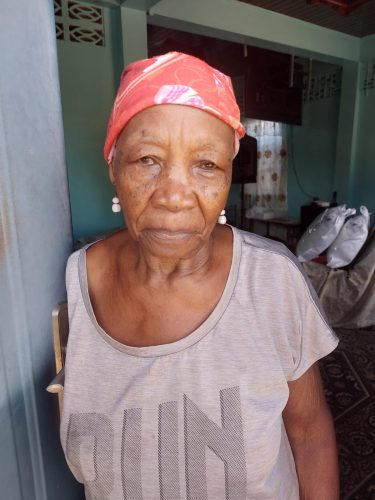Interviews and photos
by Subhana Shiwmangal
Stabroek News spoke to members of the public in the area of Caledonia and Coverden on the East Bank of Demerara about the rising cost of living and how it is affecting them. The following are their comments:
Lenord Paul, a 63-year-old excavator operator of Caledonia: `Sometimes the cost for food items is high. Right now, some of the cost for the items is high because it depends on the places you buy your items from. I’m working and living in the area and I try to purchase my items from the Chinese supermarkets because the Chinese sell cheaper than the shop in my area. I don’t buy plenty items because I collect my wages every week and buy food items. I try to cope with the high prices. If I can’t afford to buy food items, I would collect food from the boat that is located at the back of the building I reside. For example, a couple months back, 10-kg Karibee rice cost $1,300; now the rice cost $2,500. Also, before a tray of eggs cost $1,100/$1,200; now, a tray of eggs cost $1,500. Leave it to the government to reduce the cost of living because those shop owners are buying the items from the Chinese at a cheaper cost and, selling it back to us at a higher cost.’
Omeca Dalton-Badall, a 52-year-old Trinidadian: `Yes, the cost of living is affecting me a lot because when you have to pay someone to build your house and so, it is very costly and the high cost affects me a lot…I think considering Guyana is producing oil now, the cost of living supposed to reduce more. Even the cost for cooking gas gone up. Before, a 10-lbs cylinder cooking gas cost $4,000; now the gas cost $5,000/$4,000 and something. I don’t live here; I live in Trinidad and my daughter and I recently arrived in Guyana for vacation. When my mother and I visited the market in Georgetown, we saw that the cost for greens is high. For instance, pumpkin, before, a small cut of pumpkin cost $120; now the same cut of pumpkin cost $500/$400 at some vendors; the cost for ochro, bora and so gone up. To me, the cost for greens is costly in Guyana than Trinidad. I can get more ochro for less money in Trinidad. I’m trying to cope with the cost of living because my husband works and I get support from family as well. Considering Guyana is producing oil now, the government should do something about the cost of living because I’m seeing the government allowing the Chinese and other people to work in Guyana, and they treating them good but not treating Guyanese well.’
Patricia Dalton, a pensioner of Caledonia: `The cost of living is high because the cost for things is going up at the markets and shop. I try to cope with the cost of living by the grace of God. I budget and so and buy the items, I can’t do anything about it. I use my pension to buy groceries and my two sons support me financially… I saw recently the cost for greens gone up. For example, before a pound of ochro cost $400; now the ochro cost $500 a pound. Items such as the cost for garlic gone up also. A couple months back, a pound of garlic cost $400; now, a pound of garlic cost $500. I think the government should increase pensioners’ monthly stipend to help with the high cost of living.’
Emilio Martin, a 32-year-old director of Caledonia: `The cost for items has risen a little but it is not the worst compared to the rest of the world. I think the cost of living will go down in time and it hasn’t affected me much. I would look around for places that are selling items at a cheaper cost. I’m lucky I have my own transportation to carry me places also. Although, the cost for items is expensive I’m good. My fiancée and I reside together. For example, before a pound of beef at Rossignol cost about $460 a pound; now a pound of beef cost $480. Also, before 12 eggs cost $1,300/$1,400; now the same amount of eggs cost $1,600. I don’t think Guyana has a food shortage, it’s just that the farmers face challenges within agriculture and also, the cost for feed is high. We can’t blame the government for the farmers challenges.’
Sherwin Smith, a 32-year-old sailor of Caledonia said: `I receive food from the company I work for because I just work and stay here. I’m not from Guyana, I just work as a sailor on a vessel. I can’t say what is the cost for grocery items in Guyana because I eat the company food but when I purchase fast food, I find that the cost for the food is expensive. For example, a couple months back, a half food cost $1,200; now the same food cost $1,400/$1,500. Also, before, 1 litre diamond water cost about $160/$180; now the water cost $200 and something. I think the Bureau of Standards need to check business places and make sure business owners are selling their items/food in a certain price range.’
Annalesa Thomas, a 20-year-old housewife of Caledonia: `The cost for some items is cheaper while some is not…my family and I can’t really afford to purchase most items from the supermarket because of the high cost. My husband is the sole breadwinner for my son and I. Whatever we can afford to buy, we buy and don’t buy the items we can’t afford. For example, a couple months back, a pound of chicken cost $460; now the chicken cost $600/$560 a pound at some places. Right now, a big bag sugar cost $17000/$18000 so I had to opted in purchasing a 10lbs bag of sugar which cost $7,000. The cost for sugar is high. I don’t think anything could be done about the high cost of living.’
Maryann Webber, a 29-year-old housewife of Caledonia: `The cost of living is high because by the time I purchase something from the shop on the weekend, the next weekend when I return to the shop to purchase the same items, the cost increases. I’m a family of four, including my husband, his great grandmother and our daughter. My husband is the sole breadwinner for us while his great grandmother receives pension… We try to make do with whatever grocery we have; we just try to cut down on the cost for items we can’t afford. For example, a couple months back, a root of callaloo cost $100; now the same single root of callaloo cost $200 at the Soesdyke Junction. I don’t know who to complain to, about the high cost of living. There is nothing we can do about it; we just have to cope with the high cost of living.’
Ena Ghanie, a 60-year-old parttime cleaner of Caledonia: `The cost of living is hard for my family and I because the cost for items is rising in the markets/shops. For example, three months ago, a 10-kg Karibee white rice cost $2,000; now the rice cost $2,400. Also, a couple months back, a pound of chicken cost $500; now the chicken cost $600. I work two times a day as a cleaner to help my husband provide for our four grandchildren that their parents left with us. We are trying to take care of them with the money my son (their father) sends for his two children and my daughter who sometimes send money for her two children. My husband whenever he gets money from his beer he sells, he helps support us. Every day I have to find like $400 each to send these children to school. I try with my part-time work to help us as well. Things are not easy with us and then we have groceries to buy. I don’t know what to say because I don’t know who can help us because when the cost for things goes up at the shop you have to buy it.’
Jennifer Andrews, a cherry supplier of Coverden: `The cost of living is very high. Every time the cost for something increasing in the markets. Right now, the cost for cherries is high. For example, before a pound of cherries cost $100; now a pound of cherries cost $400. Even, the cost for bora gone up. Before a small bundle of bora cost $300; now that same small bundle of bora cost $1000/$1,500. My husband works and supports us but things are still expensive even though, my mother receives pension. She is sickly and the adult pampers alone for her is expensive. I look after the cherries and oranges farm and sell whatever cherries I get for a living. I use the oranges in the home sometimes. The government have to place control price on certain food items because people are selling their items high but for different prices.’
Alma Braithwaite, a pensioner of Coverden said: `The cost of living is very high for me because the cost for food items and so has gone up in the markets and shops. My grandson and I live together. I receive pension to support me while his parents support him financially. Whatever little we have, we try to make do with it. For example, before a pound of oxtail cost $800; now the oxtail cost $1,200. Also, before a pound of plantain cost $100 and something; now the plantain cost $260. Every day something going up in the markets and shops. Where the price is concerned, the government should come together and do something about it.’

